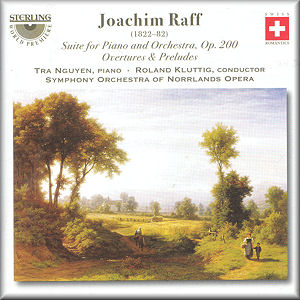Sterling are working up a commanding presence
for their Raff recordings while at the same time extending their
series of
Swiss Romantics. They are recorded as ever with
an eye to extending the knowledge of the listener. In general
they avoid duplication of the existing catalogue. They have already
presented listeners with a collection of his works for violin
and orchestra (
CDS10752)
and there’s a further disc to come.
Raff was much associated with Liszt and for years worked as his
assistant. He worked like a Trojan for Liszt through the drudgery
of writing out parts and orchestration. Even so he made time for
his own music. In fact his own production is a swelling cornucopia/
For years it has been ignored but at last is now enjoying the
first stirrings of rehabilitation. The Cavatina was Raff’s equivalent
of Sinding’s Rustle of Spring. It kept his name alive while his
other works were fading and dusty. In the early 1970s – the high
noon of the LP - Bernard Herrmann recorded Raff’s Symphony 5 Lenore
for Unicorn after championing that symphony and the Third with
the CBS orchestra in the 1940s. Tudor recorded a smattering of
the symphonies but then started again and launched a pretty fine
complete cycle directed by the gifted Hans Stadlmair. Marco Polo
beat Tudor to it but spread the eleven symphonies across two orchestras
and conductors. That cycle is no longer available except as a
virtual boxed set seemingly only from
Classics
Online. It’s a while since I heard the Marco Polos but given
the evident excellence of the technology and Stadlmair readings
the Tudor makes a natural choice. It would be interesting to hear
the impressions of others. CPO and Hyperion have also recorded
some of the symphonies and CPO have addressed the string quartets
and other chamber pieces.
There’s a great deal to learn about Raff and after you have encountered
this disc you may well have an appetite to start delving. So far
as reference material is concerned look no further than Mark Thomas’s
fully detailed website:
www.raff.org.
This is read with the forty CDs that have been issued over the
years. Many of these are still available so there’s plenty of
territory to explore. The Sterling Raff orchestral series studiously
avoids the symphonies and sets about attacking the lacunae.
Though in five movements which adopt baroque titles the large-scale Suite for piano and orchestra op. 200 lacks any hint of the precious or pastiche-contrivance. Raff instead adopts his accustomed super-romantic manner. It’s pretty melodramatic and could – especially in the outer movements - pass itself off as a concerto. Indeed it would fit snugly in the Hyperion romantic piano concerto series. There is a fugue in the first movement but its grand swirling manner reminded me of a fusion of the Schumann Piano Concerto and Brahms Second Concerto. The Menuett is stately with a touch of Purcell jostling with mid-European courtliness. The shade of Mozart fences lightly with early Beethoven. The Gavotte and Musette are balletic and glintingly emphatic with a forehint of Tchaikovsky. There's a sentimental, slender and touching Cavatina which really does look to Tchaikovsky as does the Finale which bows to the model of the Rococo Variations and the Mozartiana suite. Also to be heard amid its stately grandeur are traces of Schumann and Brahms from the first movement. It all works rather well and ends in a triumphant sparkling landslide of notes.
The Ouverture to
Eifersuchtigen has a pretty strong Mendelssohnian ‘cut’ to its supernatural jib and has some lovely woodwind solos along the way. It would go well alongside Mendelssohn's
Fair Melusine and
Athalie.
König Alfred is memorable for its Weberian horns and its sable softly glowing string lines. The antiphonal dialogue of violins and violas at 2:10 is nicely done by players and engineers. The ascent of the music to what sounds like a paean is well accomplished by Kluttig.
The overture to
Dornroschen inhabits the same realm as
Eifersuchtigen with fairy enchantment of a yet more delicate yet durable cloth. The music is gently Tchaikovskian and remnded me at time of Bantock's fairy overture
Pierrot of the Minute - all glow-worms, gauzy wings and glimmering moth-lights floating by. The solo violin decorates the line in Straussian indulgence. This is a meditative
Vorspiel and no mistake. It relies on slow enchantment rather than Beethovenian tempest.
Die Dornhecke from the same piece is a sort of mood-cousin to Mendelssohn's
Midsummer Night scherzo with delightful dialogues and complementary flights across the soundstage. Per Oman's solo violin again plays a sweetly intoned role in the prelude to the third act of
Samson. The music seems almost Gallic in its contented lulling - at times one thinks of Tchaikovsky – a twilit ‘valse triste’. Beehcham would have loved this music. The brass shade in one or two distant storm rumbles but that part this music has the sort of contented sheeny warmth associated with Saint-Saens in
Havanaise.
The repertoire is well chosen to fill the gaps in our recorded knowledge of Raff. As for the performances and the artists: these give what convinces me as a faithful evangelisation for this totally neglected and very attractive music.
The truly encyclopaedic liner-notes are by Dr Avrohom Leichtling.
I am grateful to Mark Thomas for much of the background used shamelessly in this review. More of that in my impending review of the excellent Raff symphonies box (Tudor).
Rob Barnett















